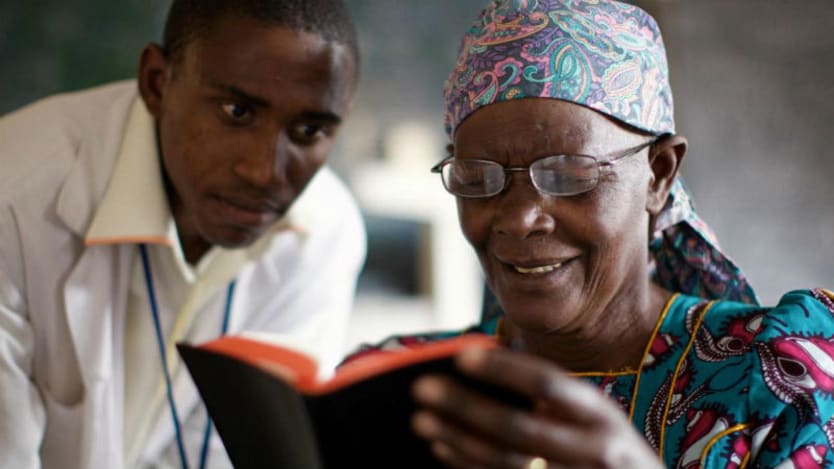
This opinion article is part of a media partnership with Bond.
Veneranda lives in rural Rwanda. Several years ago, she began experiencing vision problems, which first manifested in an “endless headache.” Soon, she was unable to mend clothes for her children, and her vision became so poor that she could no longer cook for her family, and was housebound after dark.
This is a familiar story for millions of people around the world.
See more related topics:
► New innovative finance tools aim to boost eye health care
► Q&A: Opening eyes on the impact of poor vision
► Progress on ending leading cause of blindness at near standstill, report says
► How is vision linked to the Global Goals? #Vision4SDGs Twitter chat
► Windows to the world: How eye care is about more than health
Poor vision is a major and neglected global health challenge. One-third of the world’s population of 2.5 billion people suffer from uncorrected poor vision. Of these, the World Health Organization estimates that 285 million people live with the disability of visual impairment.
The impacts of poor vision include reduced economic productivity, educational outcomes, and quality of life. An estimated $202 billion of global productivity is lost each year.
While 80 percent of all visual impairment can be avoided or cured, most developing countries cannot afford to train, equip, and pay salaries for sufficient numbers of specialists to meet their national eye care needs.
New models are urgently needed to meet this global health and development challenge.
In 2012, we launched a highly innovative collaboration with Rwanda’s Ministry of Health. With seed funding from the United Kingdom’s Department for International Development, we set out to build a nationwide eye care service that would enable all 11.8 million Rwandans to access affordable glasses and eye treatment at their local health centre.
Previous efforts to integrate local eye care into national health systems elsewhere have been largely unsuccessful. Vision for a Nation Foundation rigorously analyzed these efforts and designed its program to address the six following specific weaknesses or problems.
1. Limited capacity at primary health care level.
Innovation: VFAN partnered with the government of Rwanda and harnessed its effective primary health infrastructure.
2. Limited technical training for primary eye care.
Innovation: A highly innovative training course was developed that adds eye care to the duties of existing health centre nurses. A similar curriculum is being adopted by WHO Africa. Over 2,700 nurses across Rwanda have been trained.
3. Lack of follow-up training or supervision.
Innovation: Annual refresher training was provided to nurses and district hospital specialists have been certified to supervise eye care nurses.
4. Insufficient focus on providing glasses.
Innovation: Glasses — including adjustable glasses that focus at the turn of a dial — are provided by nurses and distributed to all 502 health centres through the Ministry of Health’s medical supply chain.
5. Low uptake of eye care services.
Innovation: Eye care services have been delivered to all 15,000 villages nationwide to raise awareness and uptake in an unprecedented, one-off campaign.
6. Low sustainability.
Innovation: The training course has been built into Rwanda’s nursing schools so all new nurses are eye care trained. Revenue generated from the sale of glasses (1 British pound, or $1.4 per pair; free for the poorest 20 percent of the population) is used to sustain the services.
Crucially, together with the Ministry of Health, we have integrated the new local eye care service into the country’s national health system. This means that today — and long into the future — any Rwandan can walk into their local health centre to have their eyes checked and to receive glasses or basic treatment. No other low-income country has achieved this critical health goal.
Veneranda is one of over 2.4 million Rwandans who have been helped so far. She purchased a pair of reading glasses from her local health centre. “These glasses will help me a lot, and I will greatly benefit from having improved vision; all my days and my life will be different.”
In 2018, we are taking our pioneering work to Ghana. We are partnering with the Ghana Health Service and NGO partners to launch a nationwide program, which will target women and children.
Rwanda demonstrates how a national eye care program can be rapidly built and sustained in a low-income country, and provides a blueprint that we hope many other countries will follow.
2018 Bond Innovation Award Winner Vision for a Nation Foundation — together with Rwanda’s Ministry of Health — has transformed eye care in Rwanda and is taking its pioneering work to Ghana.








